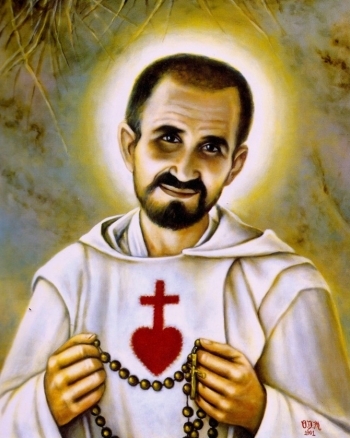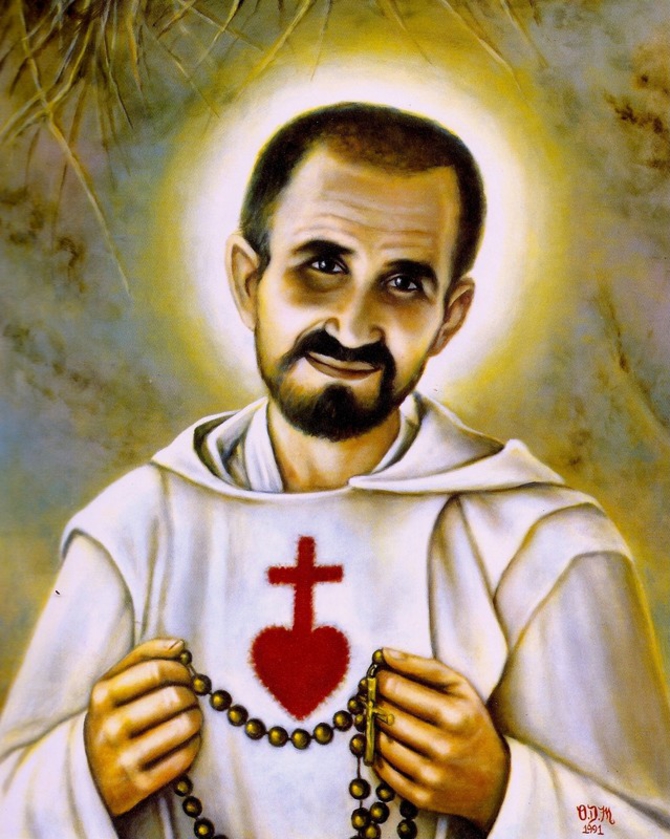
.jpg) Little Sister Leelamma
Little Sister Leelamma

Charles De Foucauld, also known as Brother Charles of Jesus, was born into an aristocratic family in Strasbourg, France. He was orphaned at the age of 6. He and his little sister were raised by his devout grandfather. He rejected the Catholic faith as a teenager, and joined the French army as it was the family tradition. He inherited a great deal of property from his grandfather.
Charles as an army officer went to Algeria with his regiment. Later he was dismissed from the army due to his misconduct. With the help of a Jewish rabbi, Charles disguised himself as a Jew and in 1883, began a one-year exploration that he recorded in a book that was well received. Seeing the faith of the Muslims, he experienced a sort of ‘restlessness’ regarding his Christian faith, which led him to a personal conversion at the age of 28.
Inspired by the Jews and Muslims he met, Charles resumed the practice of his Catholic faith when he returned to France in 1886. “My God, if you exist, let me come to know you,” was his prayer. Providence led him to meet Fr. Huvelin, a priest who would prove to be both a father and a friend to him. He was motivated to make a pilgrimage to the Holy Land, where he was fascinated by the mystery of the Holy Family, by the relationship of Jesus with his parents and neighbours, working silently and praying with humility.
He was so much taken up by the simplicity of the Nazareth experience, that he lived for some time as a hermit in Nazareth. Later he joined a Trappist monastery in Ardeche, France. Leaving the monastery in 1897, Charles worked as a gardener and sacristan for the Poor Clare nuns in Nazareth and later in Jerusalem. In 1901, he returned to France and was ordained a priest.
Later that year, Charles journeyed to Beni-Abbes, Morocco, intending to found a monastic religious community in North Africa that offered hospitality to Christians, Muslims, Jews, or people with no religion. He lived a peaceful, hidden life but attracted no companions. A former army comrade invited him to live among the Tuareg people in Algeria. He learned their language enough to compose a Tuareg-French and French-Tuareg dictionary, and to translate the Gospels into Tuareg.
In 1905, he came to Tamanrasset, where he lived the rest of his life. In early 1909, he again visited France and established an association of lay people who pledged to live by the Gospels. His return to Tamanrasset was welcomed by the Tuareg.
The outbreak of World War I led to attacks on the French in Algeria. Charles was seized in a raid by another tribe and a boy was kept to guard him. The boy saw two soldiers were coming to visit Charles de Foucauld. He fired the bullet out of fear and thus Charles fell dead on 1st December 1916 in front of the fort in Tamanrasset which he had built with the villagers for their protection. He was far away from his native land, the only Christian living alone in the village among his friends of the Tuareg tribe. He was buried in a far off place of Tamanrasset on 1st December 1916. Later his tomb was moved to El Golea, closer to human habitation.
Spirituality of Nazareth
Charles felt that his call was not to imitate Jesus’ public life of preaching, but of imitating His hidden life as a poor and humble worker at Nazareth. He had also a great desire to bring the Eucharist to people living far away in the Sahara desert. Brother Charles is remembered also as a model of “desert spirituality.”
During the rest of his life which he lived in solitude and away from his people, he had also desired to set up two fraternal communities, one for men religious and other for women religious, who would be motivated to live the ‘hidden life of Nazareth’ of Jesus. He formulated rules for these communities, based on simplicity, abjection, prayer and manual work.
He envisioned a Union of Brothers and Sisters of the Sacred Heart of Jesus, comprising Christians without having any distinction as priests, religious or laity, who would live “openly, but silently, doing good” and witnessing by their life the hidden life of Jesus at Nazareth.
He saw this as the Nazareth ideal of “living in the continual presence of God”, “preaching the Gospel not by words but by living it” and thereby in his own words becoming ‘a seductive perfume that spreads’.
According to Brother Charles, “Nazareth is the extraordinary beauty hidden in the ordinary life of an ordinary family.” He wanted to opt for radical implementation of the pure Gospel, by humility, lowliness, littleness and poverty to the extreme limit. He had a deep sensitivity towards the Eucharistic Presence of the Risen Lord, but adoration ‘through Him, with Him and in Him” extended to seeking His divine Presence concretely in the little ones.
Hospitality was the hallmark of Brother Charles. Already during his turbulent youth, he was known for sharing everything with his friends. His door was always open, as he would welcome the Master in any guest, so much so that he had to curtail even his hours of explicit prayer. Soon, he came to be known as the Universal Brother for whom nobody was a stranger.
Brother Charles valued manual labour, to be able not only to sustain himself, but also to share, up to the last morsel of bread. This included any kind of occupation. Thus, he laboured unceasingly for collecting linguistic and cultural data about the tribal nomads. He imitated the hidden Carpenter of Nazareth who in His public life became the Prophet from Nazareth and later the Risen Lord and Messiah. His spirituality was “to become nothing before God”.
Charles De Foucauld had no followers at the time of his death and would have remained virtually unknown had it not been for a biography published a few years after his death by Rene Bazin. He was beatified in Rome on November 13, 2005.
Brother Charles’ special legacy for his followers was the Prayer of Abandonment, which he prayed with Jesus, in total confidence, fused with happiness and joy, and his followers around the world continue to recite it in the same spirit.
There are nearly 20 branches of the family of Brother Charles de Foucauld in different parts of the world. One among them is the Little Sisters of Jesus Christ founded in the diocese of Eluru in Andhra Pradesh in 1984 by Little Sr. Nirmala Mary Panamthanam under the patronage of Most Rev. John Mulagada, the then Bishop of Eluru. Today, other than their communities in the diocese of Eluru, the Little Sisters of Jesus Christ render their services in different dioceses of India and Germany following the Spirituality of Nazareth.
(The Little Sisters of Jesus Christ founded in the diocese of Eluru in Andhra Pradesh in 1984 by Little Sr. Nirmala Mary Panamthanam)